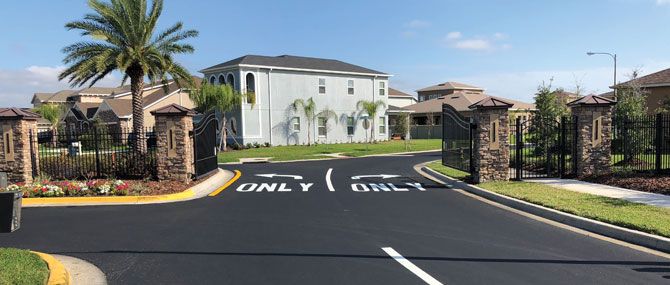
DO NOT Request Bids to Seal Your Asphalt!
By Mark Beatty / Published May 2021

What might sound like a dumb thing to say, but it’s an accurate statement unless you add the following to it, “DO NOT request bids to seal your asphalt—until you know what to request bids for.” Requesting bids to “seal the asphalt” is not the way to solicit what is best for a community’s roads and parking lots. If you’re a community manager or an HOA board member, there is a step that should be taken before bid requests go out. The right asphalt preservation strategy will keep community association dues and special assessments at a minimum as private asphalt streets and parking lots are regularly identified as the most expensive item in a community’s reserve study.
There are a number of options to seal the pavement. Maybe the seal turns the pavement black, maybe it doesn’t. Maybe it lasts one year, maybe it lasts seven years. Maybe it has a smooth surface, maybe it’s rough. Maybe the sealer is believed to release carcinogens. Believe it or not, there is a rather common asphalt sealer that is banned or restricted for use in 17 states because of its high polycyclic aromatic hydrocarbon levels, but there are no restrictions on its use in Florida.
What is a step that should be taken before requesting bids? Becoming oriented on the options available before soliciting bids is key. And just as important is using an appropriate RFP template to ensure standards are met. Turning the pavement black doesn’t necessarily correlate to effectively extending the life of streets and parking lots. You have to know what to ask for.
So, the question becomes, how does one become oriented on this topic quickly before requesting bids? I’ll share an option that many communities throughout the country have been relying upon and tell you how to obtain a simple, yet very helpful, RFP template.
 A couple of years ago our firm was asked to bid on a project for a prominent HOA community (we’ll call it Happy Neighborhood HOA), with the request stating that they would like a bid to “seal the streets” throughout the community. Seems easy and straightforward enough, right? But there are issues a community opens itself up to in this situation. You are requesting bids with no standards. Do you know what is required for a contractor to get into the pavement maintenance business? A pickup truck and tank to hold sealer along with a few other miscellaneous tools. It’s not that this minimal investment for a small contractor means he or she is bad, but it does make it more likely that what is suggested to you as the best option is only what the contractor carries in the tank regardless of the condition and demands on your pavement assets.
A couple of years ago our firm was asked to bid on a project for a prominent HOA community (we’ll call it Happy Neighborhood HOA), with the request stating that they would like a bid to “seal the streets” throughout the community. Seems easy and straightforward enough, right? But there are issues a community opens itself up to in this situation. You are requesting bids with no standards. Do you know what is required for a contractor to get into the pavement maintenance business? A pickup truck and tank to hold sealer along with a few other miscellaneous tools. It’s not that this minimal investment for a small contractor means he or she is bad, but it does make it more likely that what is suggested to you as the best option is only what the contractor carries in the tank regardless of the condition and demands on your pavement assets.
You must invest enough time to become aware of the options and standards that would be an advantage for your community. In this instance, Happy Neighborhood HOA received five bids. As is often the case, the least expensive bid provided was for a seal coat. And guess what, if you are a contractor and want to provide the least expensive seal coat bid, what do you do? You add more water and dilute the sealer to get to a lower price point. Is the contractor dishonest? Maybe a little unethical, but the contractor is meeting the bid request that has been provided. This is such a common situation. Hopefully, you can see how this process inadvertently creates an environment for not getting a valuable project completed where pavement life is actually extended. Sure, we can check the box that maintenance was done, and the roads may look pretty for a short period of time, but it’s not the best use of precious HOA funds. In this case, Happy Neighborhood HOA selected the low bid and had a project completed for roughly 40 percent of the cost of the high bid. The high bid was actually for another treatment type (non-seal coat) that a contractor provided since the pavement was an ideal candidate for this treatment that provides a three-to-five-times longer life backed by testing, showing it actually delays pavement aging. The higher bid and non-seal coat product was the best option for lowering the cost of ownership and extending the life of the pavement, but its price point appeared too costly when a seal coat was specified.
When it comes to pavement preservation, my motto has always been, “…identify the treatment to get the maximum extension of pavement life with every dollar spent.” Happy Neighborhood HOA did not get the most for their money.
High density mineral bond (HDMB) is a growing trend for effective pavement management due to its long-lasting performance and ability to lower the cost of pavement ownership. As you research options, be sure to become familiar with your pavement conditions and if this treatment is a fit for your community.
What is a great way to get oriented on preservation treatment options before requesting bids? There are pavement advisors in the industry that provide 45 minutes to an hour orientation on how to lower the cost of pavement ownership. The orientations provide a simplified tutorial on the pros and cons of various treatment types geared for HOA boards and comm-unity managers. To request an orientation, email quicktutorial@preserveasphalt.com stating your management company or HOA name and that you’d like information about receiving a pavement preservation orientation. A qualified advisor will contact you. For an RFP template, email rfprequest@preserveasphalt.com stating your management company or HOA name and that you’d like a free RFP template, and one will be emailed to you.
Mark Beatty
Senior Vice President, Holbrook Asphalt Company
Mark Beatty is on the Advisory Board for the International Pavement Management Association and consults with public agencies and HOAs throughout the U.S. He is a sought-after presenter at public works events as well as HOA seminars. Mark serves as the Sr. Vice President at Holbrook Asphalt Company. You can contact Mark at mark@holbrookasphalt.com.




